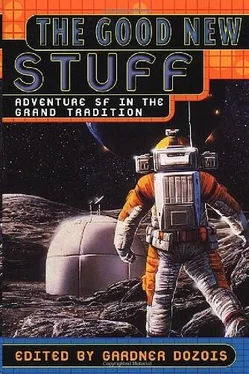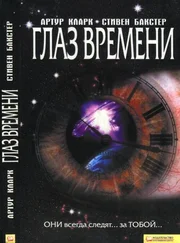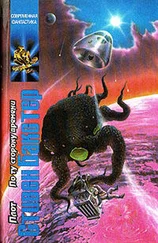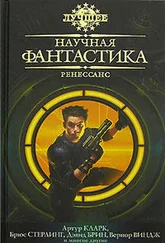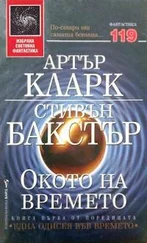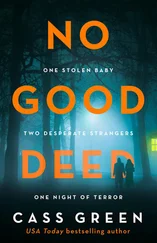Стивен Бакстер - The Good New Stuff
Здесь есть возможность читать онлайн «Стивен Бакстер - The Good New Stuff» весь текст электронной книги совершенно бесплатно (целиком полную версию без сокращений). В некоторых случаях можно слушать аудио, скачать через торрент в формате fb2 и присутствует краткое содержание. Год выпуска: 2002, ISBN: 2002, Издательство: St. Martin's Griffin, Жанр: Фантастика и фэнтези, на английском языке. Описание произведения, (предисловие) а так же отзывы посетителей доступны на портале библиотеки ЛибКат.
- Название:The Good New Stuff
- Автор:
- Издательство:St. Martin's Griffin
- Жанр:
- Год:2002
- ISBN:0-312-26456-9
- Рейтинг книги:3 / 5. Голосов: 1
-
Избранное:Добавить в избранное
- Отзывы:
-
Ваша оценка:
- 60
- 1
- 2
- 3
- 4
- 5
The Good New Stuff: краткое содержание, описание и аннотация
Предлагаем к чтению аннотацию, описание, краткое содержание или предисловие (зависит от того, что написал сам автор книги «The Good New Stuff»). Если вы не нашли необходимую информацию о книге — напишите в комментариях, мы постараемся отыскать её.
The Good New Stuff — читать онлайн бесплатно полную книгу (весь текст) целиком
Ниже представлен текст книги, разбитый по страницам. Система сохранения места последней прочитанной страницы, позволяет с удобством читать онлайн бесплатно книгу «The Good New Stuff», без необходимости каждый раз заново искать на чём Вы остановились. Поставьте закладку, и сможете в любой момент перейти на страницу, на которой закончили чтение.
Интервал:
Закладка:
But the Pauli principle didn't apply to photons; it was possible for many photons to share the same quantum state. That was the essence of the laser: billions of photons, coherent, sharing the same quantum properties.
Irina, Wu said slowly, what would happen if you could turn off the Exclusion Principle, for a piece of baryonic matter?
"You can't," Larionova said immediately.
Of course not. Try to imagine anyway.
Larionova frowned. What if one could lase mass? "The atomic electron shells would implode, of course."
Yes.
"All electrons would fall into their ground state. Chemistry would be impossible."
Yes. But you may not care…
"Molecules would collapse. Atoms would fall into each other, releasing immense quantities of binding energy."
You'd end up with a superdense substance, wouldn't you? Completely non-reactive, chemically. And almost unbreachable, given the huge energies required to detach non-Pauli atoms.
Ideal hull material, Irina…
"But it's all impossible," Larionova said weakly. "You can't violate Pauli."
Of course you can't, Dolores Wu replied.
Inside an opaqued bubble-shelter, Larionova, Dixon and Scholes sat on fold-out chairs, cradling coffees.
"If your mercuric was so smart," Larionova said to Dixon, "how come he got himself stuck in the ice?"
Dixon shrugged. "In fact it goes deeper than that. It looked to us as if the mercuric burrowed his way up into the ice, deliberately. What kind of evolutionary advantage could there be in behavior like that? The mercuric was certain to be killed."
"Yes," Larionova said. She massaged her temples, thinking about the mercuric's infection. "But maybe that thread-parasite had something to do with it. I mean, some parasites change the way their hosts behave."
Scholes tapped at a data desk; text and images, reflected from the desk, flickered over his face. "That's true. There are parasites which transfer themselves from one host to another— by forcing a primary host to get itself eaten by the second."
Dixon's wide face crumpled. "Lethe. That's disgusting."
"The lancet fluke," Scholes read slowly, "is a parasite of some species of ant. The fluke can make its host climb to the top of a grass stem and then lock onto the stem with its mandibles— and wait until it's swallowed by a grazing sheep. Then the fluke can go on to infest the sheep in turn."
"Okay," Dixon said. "But why would a parasite force its mercuric host to burrow up into the ice of a frozen ocean? When the host dies, the parasite dies too. It doesn't make sense."
"There's a lot about this that doesn't make sense," Larionova said. "Like, the whole question of the existence of life in the cavities in the first place. There's no light down there. How do the mercurics survive, under two miles of ice?"
Scholes folded one leg on top of the other and scratched his ankle. "I've been going through the data desks." He grimaced, self-deprecating. "A crash course in exotic biology. You want my theory?"
"Go ahead."
"The thermal vents— which cause the cavities in the first place. The vents are the key. I think the bottom of the Chao ice-cap is like the mid-Atlantic ridge, back on Earth."
"The deep sea, a mile down, is a desert; by the time any particle of food has drifted down from the richer waters above it's passed through so many guts that its energy content is exhausted."
"But along the Ridge, where tectonic plates are colliding, you have hydrothermal vents— just as at the bottom of Chao. And the heat from the Atlantic vents supports life: in little colonies, strung out along the mid-Atlantic Ridge. The vents form superheated fountains, smoking with deep-crust minerals that life can exploit: sulphides of copper, zinc, lead, and iron, for instance. And there are very steep temperature differences, and so there are high energy gradients— another prerequisite for life."
"Hmm." Larionova closed her eyes and tried to picture it.
Pockets of warm water, deep in the ice of Mercury; luxuriant mats of life surrounding mineral-rich hydrothermal vents, browsed by Dixon's mercuric animals….
Was it possible?
Dixon asked, "How long do the vents persist?"
"On Earth, in the Ridge, a couple of decades. Here we don't know."
"What happens when a vent dies?" Larionova asked. "That's the end of your pocket world, isn't it? The ice chamber would simply freeze up."
"Maybe," Scholes said. "But the vents would occur in rows, along the scarps. Maybe there are corridors of liquid water, within the ice, along which mercurics could migrate."
Larionova thought about that for a while.
"I don't believe it," she said.
"Why not?"
"I don't see how it's possible for life to have evolved here in the first place." In the primeval oceans of Earth, there had been complex chemicals, and electrical storms, and…
"Oh, I don't think that's a problem," Scholes said.
She looked at him sharply. Maddeningly, he was grinning again. "Well?" she snapped.
"Look," Scholes said with grating patience, "we've two anomalies on Mercury: the life forms here at the South Pole, and Dolores Wu's artifact under Caloris. The simplest assumption is that the two anomalies are connected. Let's put the pieces together," he said. "Let's construct a hypothesis…."
Her mandibles ached as she crushed the gritty Ice, carving out her tunnel upward. The rough walls of the tunnel scraped against her carapace, and she pushed Ice rubble down between her body and her carapace, sacrificing fragile cilia designed to extract soft food particles from warm streams.
The higher she climbed, the harder the Ice became. The Ice was now so cold she was beyond cold; she couldn't even feel the Ice fragments that scraped along her belly and flukes. And, she suspected, the tunnel behind her was no longer open but had refrozen, sealing her here, in this shifting cage, forever.
The world she had left— of caverns, and Chimneys, and children, and her Three-mates— were remote bubbles of warmth, a distant dream. The only reality was the hard Ice in her mandibles, and the Seeker heavy and questing inside her.
She could feel her strength seeping out with the last of her warmth into the Ice's infinite extent. And yet still the Seeker wasn't satisfied; still she had to climb, on and up, into the endless darkness of the Ice.
… But now— impossibly— there was something above her, breaking through the Ice….
She cowered inside her Ice-prison.
Kevan Scholes said, "Five billion years ago— when the solar system was very young, and the crusts of Earth and other inner planets were still subject to bombardment from stray planetesimals— a ship came here. An interstellar craft, maybe with FTL technology."
"Why? Where from?" Larionova asked.
"I don't know. How could I know that? But the ship must have been massive— with the bulk of a planetesimal, or more. Certainly highly advanced, with a hull composed of Dolores's superdense Pauli construction material."
"Hmm. Go on."
"Then the ship hit trouble."
"What kind of trouble?"
"I don't know. Come on, Dr. Larionova. Maybe it got hit by a planetesimal itself. Anyway, the ship crashed here, on Mercury—"
"Right." Dixon nodded, gazing at Scholes hungrily; the American reminded Larionova of a child enthralled by a story. "It was a disastrous impact. It caused the Caloris feature…."
"Oh, be serious," Larionova said.
Dixon looked at her. "Caloris was a pretty unique impact, Irina. Extraordinarily violent, even by the standards of the system's early bombardment phase…. Caloris Basin is eight hundred miles across; on Earth, its walls would stretch from New York to Chicago."
Читать дальшеИнтервал:
Закладка:
Похожие книги на «The Good New Stuff»
Представляем Вашему вниманию похожие книги на «The Good New Stuff» списком для выбора. Мы отобрали схожую по названию и смыслу литературу в надежде предоставить читателям больше вариантов отыскать новые, интересные, ещё непрочитанные произведения.
Обсуждение, отзывы о книге «The Good New Stuff» и просто собственные мнения читателей. Оставьте ваши комментарии, напишите, что Вы думаете о произведении, его смысле или главных героях. Укажите что конкретно понравилось, а что нет, и почему Вы так считаете.
